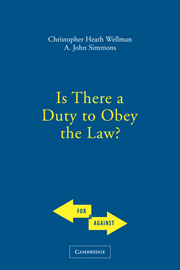1 - Why I Am Not an Anarchist
Published online by Cambridge University Press: 05 June 2012
Summary
I don't have many vivid memories from childhood, but among those that stand out, I distinctly remember sitting at a stoplight and seeing a bumper sticker that proclaimed “Taxation is slavery!” This sticker made a great impression on me because I found it so bewildering; I could not fathom why anyone would compare taxation – a natural and appropriate part of our lives – to slavery – a horribly unjust institution. Indeed, at the time (I think I was about ten), I positively looked forward to the day when I would pay taxes. This may sound farfetched, but I was in awe of all that the state accomplished. In particular, I used to sit in the car and marvel at the incredible network of roads; I remember being amazed that people were able collectively to build such an extensive system of streets by merely pooling a portion of their individual incomes. Thus, I looked forward to paying my taxes principally because I wanted to share in the credit for what I considered a monumental communal achievement.
Probably because I thought it was too outlandish to be explained, I did not ask my father why anyone would compare taxation to slavery. As a consequence, it was not until many years later that I finally understood the point of the bumper sticker. Taxation and slavery are alike insofar as both involve others nonconsensually taking at least a portion of the fruits of one's labor.
- Type
- Chapter
- Information
- Is There a Duty to Obey the Law? , pp. 3 - 29Publisher: Cambridge University PressPrint publication year: 2005
- 15
- Cited by

